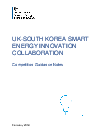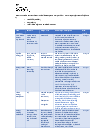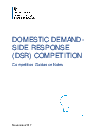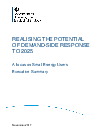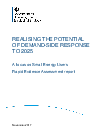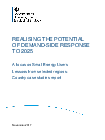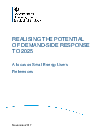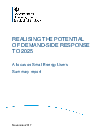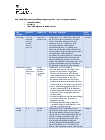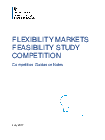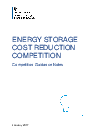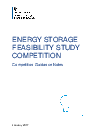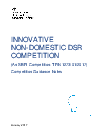A commitment to smart energy
Enabling a smarter, more efficient energy system is a priority for government and in the Upgrading our energy system: smart systems and flexibility plan published in July 2017, the government committed up to £70 million to smart energy system innovation.
Across government, Innovate UK, Research Councils, and BEIS expect to invest around £265 million in smart systems research, development, and demonstration.
As part of this commitment, within the BEIS Energy Innovation Programme, BEIS expects to invest up to £70 million in the smart energy systems innovation theme.
Power Forward Challenge: funding for UK / Canada joint challenge on smart energy systems innovation
As electric vehicles, smart devices, storage systems, remote connectivity and the like become more commonplace, the demands placed on our electricity grids are highly complex and very different from when they were built.
Through the Power Forward Challenge, the UK and Canada are jointly offering over £11 million to develop the best smart energy systems, including grids and storage, for the needs of the 21st Century, supporting the UK Industrial Strategy Clean Growth Grand Challenge around smart systems for the future.
The Challenge is looking for innovators from any sector who can bring disruptive technologies or new thinking to develop clean, robust and flexible power grids and energy systems that anticipate and meet the needs of networks around the world, looking ahead to 2030 and beyond.
Funding opportunity 1: Feasibility study development – open to SMEs
BEIS will fund selected UK SMEs for participation support, and the Canadian government will fund the selected Canadian enterprises. UK SMEs can apply for up to £60,000 SME participation support for feasibility study development.
Funding opportunity 2: Pilot-scale demonstration proposals – open to companies and other organisations
BEIS will fund the selected UK-based demonstration projects and the Canadian government will fund the demonstration projects located in Canada. Project teams applying for support for demonstration projects must involve organisations from both the UK and Canada. The project teams can apply for funding contribution of up to £1.8 million per project for demonstration projects located in the UK.
How to apply – Deadline 15 March 2019
Read the detailed Challenge Applicant Guide and complete the online application forms available on the Impact Canada website.
In addition UK-based project teams should complete and submit, together with their application form, this UK demonstration project annex:
MS Word Document, 127KB
This file may not be suitable for users of assistive technology.
Request an accessible format.
If you use assistive technology (such as a screen reader) and need a
version of this document in a more accessible format, please email enquiries@beis.gov.uk.
Please tell us what format you need. It will help us if you say what assistive technology you use.
Event
We are holding an information event on 17 October 2018 at Telford in the UK:
For those who can’t attend either, we will post the webinar presentation here after the event.
Funding for UK/South Korea bilateral collaboration on smart energy innovation
Reflecting a shared interest in innovation to help to secure a smarter, efficient energy system, the UK and South Korean governments committed up to about £6 million in total, from 2018 to 2021, to deliver a bilateral competition on smart energy innovation. This innovation collaboration, announced by the Energy and Clean Growth Minister Claire Perry on 25 January 2018, is expected to help secure cost savings in the energy system by accelerating the speed and extent of deployment of smart, flexible energy system solutions as well as securing increased market knowledge and access in South Korea for UK companies.
This competition is now closed to applications. The 3 projects which have secured funding in the competition are:
- DROPLET (Demand Response using Off-peak Power for Liquefied air Energy storage Technologies) – led in the UK by Doosan Babcock Ltd
- Energy Flexibility via V2G Gamification – led in the UK by Grid Duck
- Project Artemis (flexibility trading platform) – led in the UK by Electron
All projects are expected to be completed and to disseminate learning by March 2021.
PDF, 145KB, 1 page
This file may not be suitable for users of assistive technology.
Request an accessible format.
If you use assistive technology (such as a screen reader) and need a
version of this document in a more accessible format, please email enquiries@beis.gov.uk.
Please tell us what format you need. It will help us if you say what assistive technology you use.
Full details of the competition:
PDF, 235KB, 34 pages
This file may not be suitable for users of assistive technology.
Request an accessible format.
If you use assistive technology (such as a screen reader) and need a
version of this document in a more accessible format, please email enquiries@beis.gov.uk.
Please tell us what format you need. It will help us if you say what assistive technology you use.
Funding for non-domestic smart energy management
The government is planning to commit up to £8.8 million to develop innovative approaches to energy management using smart meter data, tailored to the needs of smaller non-domestic sites.
The Non-Domestic Smart Energy Management Innovation Competition will aim to drive innovation in the energy services market in 3 priority non-domestic sectors (hospitality, retail, schools). It will help such non-domestic organisations cut their energy costs and be more energy efficient, enabling them to boost productivity and contribute to UK emissions reduction targets. It will also develop and strengthen the market for energy management products and services for smaller non-domestic sites, including both independent businesses and chains.
Up to 9 projects, distributed across these 3 sectors, will be selected to receive initial funding to develop innovative energy management solutions using smart meter data. Details of these initial projects can be found on the Non-Domestic Smart Energy Management Innovation Competition page
Details about the competition are set out in the Competition Brief.
This competition is supported by the findings of a major primary research project conducted over 2015 and 2016, which used a qualitative, cluster-based approach to identify the barriers and enablers to smart energy management in a variety of non-domestic premises. The design of the competition was also informed by an expert workshop convened by BEIS in March 2017.
Funding for innovative domestic Demand Side Response demonstrations
The government is committing up to £7.75 million from 2018 to 2021 to support innovative domestic applications of Demand Side Response (DSR) technologies and business models. This grant competition will support up to 30 feasibility studies (Phase 1) and 10 demonstration projects (Phase 2) in domestic settings. We are looking for innovative, scalable and replicable solutions which could provide reliable domestic demand side response using a range of approaches, which could involve storage heaters, decarbonisation of heat and business models with novel usage of flexible demand.
This competition will be delivered in two phases. In Phase 1, grants of up to £30,000 will be awarded for 10 week feasibility studies. In Phase 2 grants of between £250,000 and £1 million will be awarded for demonstration projects, to be completed by 31 December 2020.
Details of the projects supported in Phase 1 of this Competition are set out here:
PDF, 192KB, 5 pages
This file may not be suitable for users of assistive technology.
Request an accessible format.
If you use assistive technology (such as a screen reader) and need a
version of this document in a more accessible format, please email enquiries@beis.gov.uk.
Please tell us what format you need. It will help us if you say what assistive technology you use.
Full details about the competition are set out in the Competition Guidance Notes.
PDF, 492KB, 35 pages
This file may not be suitable for users of assistive technology.
Request an accessible format.
If you use assistive technology (such as a screen reader) and need a
version of this document in a more accessible format, please email enquiries@beis.gov.uk.
Please tell us what format you need. It will help us if you say what assistive technology you use.
For more information, please email smart.innovation@beis.gov.uk
Research on Realising the Potential of Demand Side Response
Research was commissioned by BEIS into realising the potential of DSR to 2025 to improve the evidence base on the potential of small-scale DSR and inform policy development targeted at a smarter energy system. The research uses an evidence review (a Rapid Evidence Assessment) and country case studies, both covering four research areas: policy interventions, business strategies, DSR products and services, and consumer engagement and participation.
PDF, 148KB, 7 pages
This file may not be suitable for users of assistive technology.
Request an accessible format.
If you use assistive technology (such as a screen reader) and need a
version of this document in a more accessible format, please email enquiries@beis.gov.uk.
Please tell us what format you need. It will help us if you say what assistive technology you use.
PDF, 1.15MB, 66 pages
This file may not be suitable for users of assistive technology.
Request an accessible format.
If you use assistive technology (such as a screen reader) and need a
version of this document in a more accessible format, please email enquiries@beis.gov.uk.
Please tell us what format you need. It will help us if you say what assistive technology you use.
PDF, 814KB, 77 pages
This file may not be suitable for users of assistive technology.
Request an accessible format.
If you use assistive technology (such as a screen reader) and need a
version of this document in a more accessible format, please email enquiries@beis.gov.uk.
Please tell us what format you need. It will help us if you say what assistive technology you use.
PDF, 226KB, 13 pages
This file may not be suitable for users of assistive technology.
Request an accessible format.
If you use assistive technology (such as a screen reader) and need a
version of this document in a more accessible format, please email enquiries@beis.gov.uk.
Please tell us what format you need. It will help us if you say what assistive technology you use.
PDF, 725KB, 57 pages
This file may not be suitable for users of assistive technology.
Request an accessible format.
If you use assistive technology (such as a screen reader) and need a
version of this document in a more accessible format, please email enquiries@beis.gov.uk.
Please tell us what format you need. It will help us if you say what assistive technology you use.
Funding for flexibility markets feasibility studies
As part of the Upgrading our energy system: smart systems and flexibility plan, in July 2017, government launched a competition on local flexibility markets, committing up to £600,000 for feasibility studies about innovative approaches that can be used to value and trade flexibility in the UK electricity system. This competition is now closed for entrants. Details of the projects supported by this competition:
PDF, 166KB, 2 pages
This file may not be suitable for users of assistive technology.
Request an accessible format.
If you use assistive technology (such as a screen reader) and need a
version of this document in a more accessible format, please email enquiries@beis.gov.uk.
Please tell us what format you need. It will help us if you say what assistive technology you use.
Details about the competition are set out in the guidance notes:
PDF, 457KB, 34 pages
This file may not be suitable for users of assistive technology.
Request an accessible format.
If you use assistive technology (such as a screen reader) and need a
version of this document in a more accessible format, please email enquiries@beis.gov.uk.
Please tell us what format you need. It will help us if you say what assistive technology you use.
For more information, please email smart.innovation@beis.gov.uk.
Funding for innovative electric vehicle-to-grid projects
In July 2017, government committed up to £20 million for innovative projects that develop future electric vehicle-to-grid products, services and knowledge. Details about competition winners:
Innovation in Vehicle-to-Grid V2G Systems – Feasibility Studies – Competition Results
Innovation in Vehicle-to-Grid V2G Systems – CR D – Competition Results
Innovation in Vehicle-To-Grid V2G Systems – Real-World Demonstrators -Competition Results
Funding for energy storage cost reduction and feasibility studies
Government launched a competition with up to £9 million available to reduce the cost of energy storage technologies (including electricity storage, thermal storage, and power-to-gas technologies). This includes a further £600,000 to support feasibility studies for a potential first-of-a-kind, large-scale future storage demonstrator. This competition is now closed for entrants. Details of the projects supported by this competition:
PDF, 171KB, 4 pages
This file may not be suitable for users of assistive technology.
Request an accessible format.
If you use assistive technology (such as a screen reader) and need a
version of this document in a more accessible format, please email enquiries@beis.gov.uk.
Please tell us what format you need. It will help us if you say what assistive technology you use.
Grants have now been awarded for delivery of energy storage feasibility studies for large-scale future storage demonstrators. These initial feasibility studies are being led by the following organisations:
- Cumulus Energy Storage Ltd;
- Highview Enterprises Ltd;
- ITM Power Trading Ltd;
- SSE Renewables Developments UK Ltd
For more information, please email smart.innovation@beis.gov.uk.
Full details about the cost reduction competition, and the feasibility study are set out in the guidance notes here:
PDF, 482KB, 35 pages
This file may not be suitable for users of assistive technology.
Request an accessible format.
If you use assistive technology (such as a screen reader) and need a
version of this document in a more accessible format, please email enquiries@beis.gov.uk.
Please tell us what format you need. It will help us if you say what assistive technology you use.
PDF, 482KB, 31 pages
This file may not be suitable for users of assistive technology.
Request an accessible format.
If you use assistive technology (such as a screen reader) and need a
version of this document in a more accessible format, please email enquiries@beis.gov.uk.
Please tell us what format you need. It will help us if you say what assistive technology you use.
Funding for innovative non-domestic Demand Side Response demonstrations
Government committed up to £7.6 million for innovative demonstrations of energy demand side response technologies in UK businesses or public sector organisations to reduce their energy use in peak times and provide flexibility to the energy system. This competition is now closed for entrants.
Phase 1 contracts have now been awarded for delivery of feasibility studies for the innovative non-domestic demand side response demonstrators. These initial feasibility studies are being led by the following organisations:
- DuckDuck Ltd;
- Flexitricity Ltd;
- Innovatium LLP;
- Kiwi Power Ltd, and
- Totem Sustainable Solutions Ltd
Details of the Phase 2 projects supported by this competition:
PDF, 151KB, 1 page
This file may not be suitable for users of assistive technology.
Request an accessible format.
If you use assistive technology (such as a screen reader) and need a
version of this document in a more accessible format, please email enquiries@beis.gov.uk.
Please tell us what format you need. It will help us if you say what assistive technology you use.
Details about the competition are set out in these guidance notes:
PDF, 630KB, 80 pages
This file may not be suitable for users of assistive technology.
Request an accessible format.
If you use assistive technology (such as a screen reader) and need a
version of this document in a more accessible format, please email enquiries@beis.gov.uk.
Please tell us what format you need. It will help us if you say what assistive technology you use.


